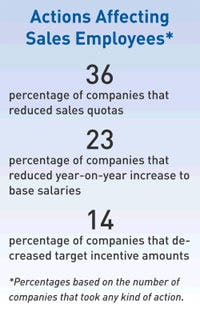MedTech Sales Staffs Feel Economic Stress
September 1, 2009
News Trends
|
When patients and hospitals cut back on spending for medical products, the effects are felt throughout a manufacturer's business. As a result, some companies may need to cut their medical device sales representatives some slack, according to a market research report by ZS Associates (Boston).
With the economy still mired in a recession, the report found that medical products companies have tried to lessen its effect on product sales. For example, 36% of the firms surveyed have decreased sales quotas for their workers. But some salespeople may not be around to see the drops. The report also found that involuntary turnover among sales forces has increased four percentage points (from 3% to 7%) over the past year. Sales employees that have not been let go are staying put, however. The voluntary turnover rate has declined to 9% (from 12%) over the same period.
“While markets for medically necessary products have held firm, spending on medical products tied to discretionary or consumer-driven procedures, such as cosmetic surgery, has declined in the current economy,” says Chad Albrecht. He is an associate principal with ZS Associates and the lead researcher on this study.
Even manufacturers of equipment for common medical procedures have felt a pinch. For example, hospitals are reducing capital spending by holding off on big MRI and CT scanner purchases. Consequently, device firms are adjusting quotas for sales reps and tweaking their incentive programs to corral costs.
Executives cited setting fair sales quotas as their top concern, according to the study. However, just more than one-third of the companies are making changes to quotas to mitigate the effects of the current economic climate. Albrecht warns that companies that stick to unrealistic national forecasts may experience a decrease in sales, an increasingly apathetic sales force, and more employee turnover.
Although healthcare reform is still in its infancy on Capitol Hill, observers say industry can expect further medical reimbursement reductions. If that goes as planned, downward pressure on product prices will continue, the market research firm says.
ZS Associates' study surveyed employees from 42 U.S.-based medical companies. For an executive summary of the study, e-mail [email protected].
Copyright ©2009 Medical Device & Diagnostic Industry
About the Author(s)
You May Also Like


.png?width=300&auto=webp&quality=80&disable=upscale)
